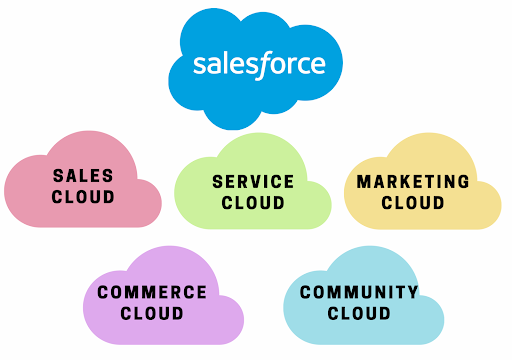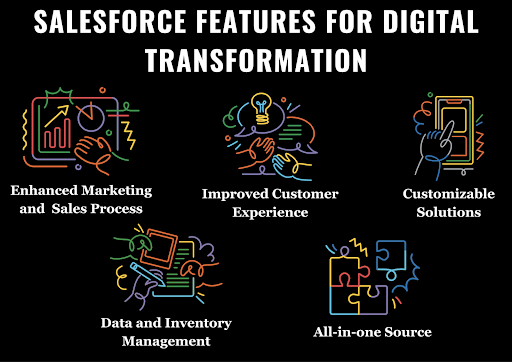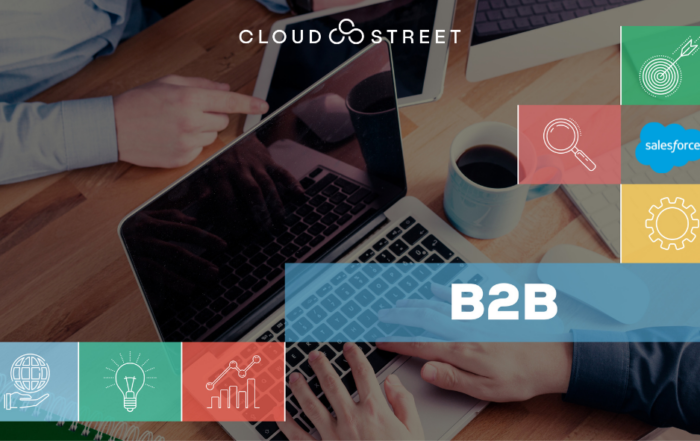The Role of Salesforce in B2B Digital Transformation

In a world of constant innovations in technology and evolving consumer demands, B2B companies are awakening to an important realization—the urgency to embrace the digital shift to be able to thrive and stay ahead of competitors.
Adopted by forward-thinking businesses, Customer Relationship Management (CRM) software emerges to be a vital aspect of the digital shift. Salesforce, a CRM platform, is the pioneer of this development. It enables B2B organizations to adapt, evolve, and thrive in the digital era.
What is Salesforce?
With technological advancements, computers became more common; businesses began using Excel sheets and files to manage their customer data. However, this method soon became laborious and inefficient, especially for huge amounts of data. Every person in the organization needed to be capable of handling and analyzing enormous amounts of user data. This was the time when CRM entered the scene of the digital revolution, delivering the best CRM platform, Salesforce, to the world.
Salesforce is a well-known American cloud-based software corporation that offers CRM services. It is a prevalent CRM solution used by support, marketing, and advertising departments all across the world.

Salesforce services empower organizations to capitalize on cloud-based technology to interact more effectively with clients, suppliers, and prospective clients. Businesses can monitor customer behavior, promote to customers, and perform many other tasks with the Salesforce CRM.
Salesforce is a multi-tenant layout that began as software-as-a-service (SaaS) and offers advantages, including API Integration, installation, scaling, unlimited capabilities, inexpensive possession, interface assistance, etc.
Salesforce has a subscription-based payment system. It stores all the data in the cloud. So, you can access it from every device with an internet connection.
Working Elements of Salesforce
Salesforce is a well-designed platform with multiple elements that work collaboratively for effective CRM solutions. Here are the essential elements of Salesforce:
- Storing Data: Salesforce’s comprehensive database, which houses all customer data, such as prospects, user accounts, links, possibilities, and more, is the driving force behind the software. All engagements and activities carried out on this platform are built on an understanding of this data.
- Interface: Users may access their customized workstations and functions on Salesforce by logging in with their specific credentials.
- Records: Salesforce objects, which consist of leads, accounts, contacts, and Prospects, are used for organizing different kinds of data. Records are specific entries contained under these objects.
- Workflow: By automating activities, notices, and activities based on default requirements, workflow guidelines, workflow developers, and procedure approvals can ensure accuracy and effectiveness.
- Customization: Through customized code or low-code resources like Salesforce Lightning App Builder, managers can change design elements, fields, and objects, develop personalized programs, and add automation.
- Security: The organizations may establish restricted access to ensure employees have sufficient privileges and are able to access relevant details. Features like two-factor authentication increase additional security.
- Collaboration: Salesforce has collaborative services, for example, Salesforce Chatter, which facilitates users to interact and work together within the application. Teams may communicate more efficiently, explore prospects, and share insights.
- Analytics: Users can design unique dashboards and reports that quantify key performance indicators, illustrate data trends, and help in decision-making.
- Integration: Salesforce’s ability to integrate improves connectivity and makes sure that data is updated across several platforms.
- Upgrades: Salesforce is an application that relies on the cloud; therefore, it is regularly updated and modified. The smooth implementation of such updates guarantees that businesses are constantly granted access to the current services and security upgrades.
Salesforce Services
Salesforce is a lot more than just client contact details and sales data. It is an extensive network designed to facilitate the whole business, sales, marketing, and client service under a single, complete perspective of every client. The clouds can see Salesforce’s primary service solutions; they are fundamental solutions that may be used independently or in collaboration with other brand-specific sales stack integrations. The following “Clouds” are used to categorize Salesforce services.

Sales Cloud
Sales Cloud is a CRM developed to help data-driven sales departments. Salesforce integration is a prominent sales solution that enables organizations to increase the pace of their sales funnel and streamline leads to profit. It benefits organizations by helping in sales and offering marketing support. Moreover, it helps with client service for B2B and B2C relationships. It offers the ability to use numerous additional applications via the AppExchange and covers sales, marketing, lead creation, customer support, business data analysis, etc.
Service Cloud
Service Cloud is a platform for customer service that helps organizations perform more efficient and effective customer support. It has elements including case management, database and live conversations. With the help of the service cloud, clients may contact customer support from any system and receive assistance as needed.
Marketing Cloud
Salesforce’s Marketing Cloud is an application intended to help marketing professionals manage customer interactions that traverse an overwhelming, constantly growing list of platforms and technologies. It offers one of the top digital marketing solutions to advance the marketing objectives of any business. With just one click, it enables businesses to send personalized bulk emails to any number of prospective customers. Additionally, it helps in resolving consumer problems with any product.
Commerce Cloud
It is an e-commerce system. It helps organizations in the development and management of their virtual shops. It aids with order administration, inventory management, and handling payments. Salesforce offers a pre-built platform for creating online shops, product landing pages, marketing initiatives, and AI-powered suggestions. To offer an enhanced customer experience, it integrates consumer data.
Community Cloud
The community cloud service offers a platform for upholding interactions among staff members, clients, and business associates. Businesses can provide a customized solution to every user when using the community cloud. Customers have access to communities that can efficiently address their issues or concerns. Also, it allows users to share any information and pictures.
What do the Numbers Say for Salesforce?
When we talk about any successful technology or business tool, statistics play an important role in knowing their success over the years. Here are some interesting statistics about Salesforce that would compel you to accept it as the face of B2B transformation:

- Salesforce has generated a net income of over $200 million in 2023.
- Over 150,000 companies worldwide have integrated Salesforce into their workflow to enhance their business growth.
- The annual revenue of Salesforce reached its record high in fiscal year 2023 with $31 billion.
- Salesforce ranks 11th in Fortune’s list of the World’s most admired companies.
- Salesforce functions successfully from 95 offices in 84 countries around the world.
- Salesforce reached 100% renewable energy usage and zero residual emissions across all its chains in 2021.
- There are approximately over 6,349 Salesforce consultants working in the United States of America.
Salesforce Features for Digital Transformation
Salesforce has been a leading CRM tool for many businesses and organizations around the world. What makes it the first choice of businesses is the transformation it brings to the working environment of an organization. The ease of performing various functions and workflows makes it an ideal solution. Here are some of the key features of Salesforce:

Enhanced Marketing and Sales Process
Salesforce eliminates the gap across the marketing and sales departments, providing more effective coordination and communication. B2B businesses can easily manage and nurture prospects, organize marketing initiatives, and obtain more insight into consumer habits with integrated technologies like Salesforce Sales Cloud and Marketing Cloud to help enhance sales effectiveness.
Salesforce’s Marketing Cloud gives companies the ability to design personalized and targeted marketing campaigns that reach the right customers at the ideal moment with the right content. Salesforce’s Commerce Cloud helps companies offer consumers an effortless and customized online buying experience.
Improved Customer Experience
Salesforce as an application offers numerous ways for an organization to strengthen customer engagement, including organizing data concerning a customer’s business, offering perspectives on consumer choices or ordering items, using social media platforms, tracking specific client experiences, and comprehending and solving customer support issues.
Salesforce unifies all client data into a single, integrated viewpoint, giving businesses a comprehensive understanding of their clients. With the help of such a broad perspective, marketing, sales, and customer support teams are more familiar with client demands, choices, and connections, resulting in more customized and efficient engagement.
Data and Inventory Management
In the world of e-commerce, supply management is an essential responsibility that can improve business operations and enable companies to provide consumers with a seamless multichannel shopping experience. Distributors may have an effortless order processing procedure with the Salesforce B2B eCommerce system and a straightforward, uniform picture of their supply chain for both their online and offline businesses. Furthermore, they are able to keep track of stock levels and make requests according to product order records, supply and demand, earnings a product generates, and its lifespan.
Customizable Solution
Businesses must be flexible and quick in the age of digital revolution. Salesforce offers organizations a highly adaptable framework that can be customized to meet the particular requirements of various organizations. When a customer visits an eCommerce site, B2B companies can show off a customized shop layout using a Salesforce platform’s customizable product display.
A Salesforce B2B eCommerce system that satisfies customer demands for specific goods can succeed in online sales platforms and foster client loyalty. Additionally, Salesforce’s AppExchange offers a number of external apps that may be coupled with Salesforce to improve flexibility and agility.
All-In-One Source
Salesforce includes all of the following services: social, mobile, data analytics, and cloud. It is totally cloud-based and accessible on mobile gadgets as well. It enables the integration of mobile technology into sales operations and guarantees that organizations may benefit from new developments like the Internet of Things (IoT) to improve the user experience. Salesforce helps businesses create integrated experiences while handling their social networking activity efficiently. Last but not least, Salesforce acts as a force of analysis by transforming data into useful insights using AI and machine learning.
What’s Next
Adapting to the growing technologies is necessary for all industries. It is necessary for B2B companies to adapt to this change and turn to e-commerce for effective marketing and great ROIs. Salesforce plays a significant role in helping companies enhance their customer experience and overall growth in marketing and sales funnel. Salesforce implementation can be overwhelming for certain businesses. To overcome this hurdle and have a smooth implementation, Cloudstreet has been at the forefront of Salesforce consultancy. With a team of experienced professionals, we work on the various Salesforce services and help you at every step.
FAQs about Role of Salesforce in B2B Digital Transformation
1. What are the three main components of digital transformation?
The three main components of digital transformation include:
- Process optimization
- Enhancing the customer experience
- Supporting employees and empowering their relationship with customers
2.Is Salesforce used for digital marketing?
Salesforce Marketing Cloud service is used in digital marketing. You will have the chance to get more consumers, grow leads, generate attractive personalized emails, advertise on social media, and additionally have access to predictive intelligence skills with Marketing Cloud’s leading-edge automated marketing, creative templates, and analytics tools.
3. What is the benefit of Salesforce automation?
Salesforce automation is used to speed up and simplify sales procedures. It improves accuracy. Organizations may additionally minimize expenses, boost production, and enhance effectiveness by implementing workflow automation.
4. What technology is used in Salesforce development?
The most prevalent languages and tools used for Salesforce development include JavaScript, HTML, CSS, Apex, Visualforce, and Visualforce Lightning. Furthermore, tools such as Heroku, Git, and Ant can be implemented to improve the Salesforce development procedure.
5. What is Salesforce digital engagement?
Salesforce Digital Engagement (SFDE) is an extensive suite of tools, methods, and features. It allows enterprises to build engaging and tailored client experiences across a range of digital platforms and interfaces, as well as send replies to messages through several platforms, such as Facebook Messenger, WhatsApp, and SMS. It can link your consumers around the world through various messaging techniques and enable your representatives to communicate with any number of customers simultaneously in a chat window.
6. How do I use digital experience in Salesforce?
With the following steps, you can effortlessly use digital experience in Salesforce:
- Enter “Digital Experiences” in the Quick Find box under Setup, then click “All Sites.”
- Make your choice for Digital Experiences.
- Put in a distinctive domain name.
- Choose Check Availability.
- Click OK after clicking Save.
7. What is an example of digital transformation?
Some of the best examples of digital transformation are Netflix, Nike’s SNKRS app, Airbnb, Tesla, CRM systems in businesses, IKEA applications, etc.
Discover insights that drive results - explore out latest blog posts now
Unlocking B2B Success with Salesforce Experience Cloud
Unlocking B2B Success with Salesforce Experience Cloud In today’s [...]
Future-Ready: How AI is Shaping the Mid-Market Manufacturing Landscape
Future-Ready: How AI is Shaping the Mid-Market Manufacturing Landscape [...]
Drowning in Data? Get Expert Data Entry Help for Only $9/Hour!
Data overload slowing you down? Spending too much valuable [...]


